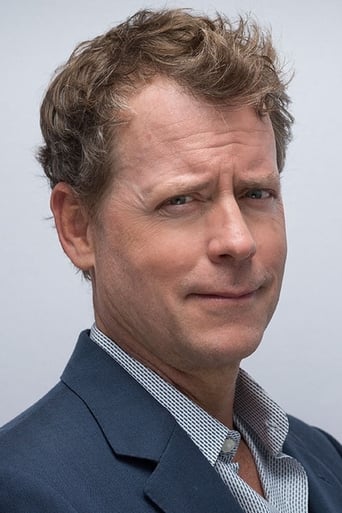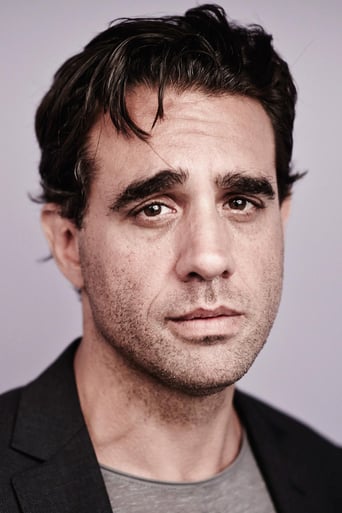Kattiera Nana
I think this is a new genre that they're all sort of working their way through it and haven't got all the kinks worked out yet but it's a genre that works for me.
Stometer
Save your money for something good and enjoyable
Odelecol
Pretty good movie overall. First half was nothing special but it got better as it went along.
Ezmae Chang
This is a small, humorous movie in some ways, but it has a huge heart. What a nice experience.
SnoopyStyle
Fast food chain Mickey's Burger has a hit in the Big One. Don Anderson (Greg Kinnear) is a marketing VP in development in their California headquarters. Independent research has found extremely high fecal count in their frozen patties and Don is sent to the Colorado meat-packer to investigate. Old-timer Rudy Martin (Kris Kristofferson) tells him about the hard truths. Harry Rydell (Bruce Willis) is their corrupt meat buyer. Amber (Ashley Johnson) and Brian (Paul Dano) work at the local Mickey's. Amber lives with her single mom Cindy (Patricia Arquette) and they're visited by activist uncle Pete (Ethan Hawke). Meanwhile illegals like Raul (Wilmer Valderrama), Coco (Ana Claudia Talancón), and Sylvia (Catalina Sandino Moreno) sneak into the US to become part of low wage workforce being exploited. Supervisor Mike (Bobby Cannavale) abuses his position by hooking up with Coco. Her sister Sylvia is not happy with the relationship and her drug use.Director Richard Linklater is adapting the scathing investigative book on the fast food industry by layering three stories on top of the material. It leaves the movie scattered, a bit flat, and too preachy to have much compelling shock factor. Linklater is caught trying to make drama while doing a documentary. I do find two of the three stories to be pretty interesting. I don't like Kinnear's character's awkward naivety. He's in the meat business but has to act dumb. Willis may as well twirl his evil mustache. There is a tale of corporate political corruption but it fails to dramatize it. Ashley Johnson is an interesting lead but her side of the story pales in comparison to the illegals working in the plant. I think that is where the movie shines and it also has the horrifying slaughter room walk-through. The movie would have been more compelling concentrating on that story.
Jon
I'm a near-vegetarian, and have been now for several years. I've been acutely aware of the of fast food factory farming, and I've educated myself in the horrors of fast food's effects on heart disease, cancer, diabetes, obesity, soil erosion, greenhouse emissions, and the corporate greed and governmental indolence that allows it to poison the citizenry daily. In addition, I've battled my own addiction to fast food and obesity over years, and have helped my father battle his cancer through nutrition; I consider fast food a personal enemy, not just an abstract irritant.Beyond that, I'm a fan of director Richard Linklater, and his "Slacker" and "Waking Life" are two of my favorite films.In short, if there's anyone who *should* like "Fast Food Nation," it's me. But this movie is wretched disaster! Linklater takes a non-fiction book as his source material, and tries to make a story out of it, or not--maybe he tried, maybe he didn't--all I know is it didn't happen. This a wandering, meandering mess of meaningless, useless characters.There's a corporate schmoe who's just learning how unclean the meat his company produces actually is. A story almost develops around his investigation of how it's produced, but its dropped just when it seems to be going somewhere.There's a group of illegal aliens hired by a criminal meat-packing plant--but we don't care about them either. They're presented as stock figures in ensemble. The attempt at creating a story for them is pathetically feeble.Linklater trots out other almost-characters in turn, the high-school boy who fantasizes about robbing his fast-food store (but doesn't), and the girl who tries to set cows free, but these are non-events, too.I lost interest in the film early on, but kept watching as long as I could stand past that point, well past the middle. After that, I fast-forwarded, stopping occasionally to see if there was anything worth watching. There wasn't, at least, not for me.This is a crying shame. More than that, it's an infuriating shame. Linklater is nothing if not a visionary director, the cast is nothing if not talented, and the subject is nothing if not a matter of paramount importance. FFN should've been a wild, sardonic, exposé, a trip into the innards of the food industry's machine with the entertainment to keep you in your seat, and the honesty to enlighten you.Apparently, FFN *has* worked for some people, and for that I'm grateful, but I can't recommend it myself. Morgan Spurlock's wonderful, shocking, and yet enjoyable "Super-Size Me" is the one to watch, hitting all the bases that FFN should've, with wit, humor, and compassion to spare.
colour-me-kubrick
Considering Linklater was at the helm of the affairs, it is fair to say this was a bit of a let down. The movie clearly has a very strong theme with enough facts and materials to drive home the point which it very well does for the best part."In California, the VP of Marketing of the Mickey's Fast Food Don Anderson is responsible for the hamburger "Big One", the number one in selling in Mickey's chain of fast food restaurants. When an independent research in the meat patties produced in Cody, Colorado, indicates the presence of cow manure, Don is sent to the facility to investigate possible irregularities in the meatpacking production plant and also the major supplier of kettle. Along his surveys, Don finds the truth about the process and how meat is contaminated. Meanwhile, a group of illegal Mexican immigrants arrive in Cody to work in the dirty jobs in the plant while a group of activists plot how to expose the terrible situation of the Mickey's industry." Therefore the film deals with subject of meat production from the whole range of different perspective from the retailers to the manufacturers of burgers to the meat producing agencies to the illegal immigrants who get employed and are exploited to the fullest and of course to the consumers who finally bear the burden. This broad spectrum helps to look beyond just the malpractices in the meat industry but a basic flaw in the modern mindset. The culture of "do what it takes" that has been instilled into the corporate house has made the everyone pay a big cost monetarily or otherwise, other than the elite who continue to grow bigger. Might is right as they say. "Fast" food in the film reflects not only the obsession and addiction to the quick food, but as a reference to culture which has been instilled in our system to produce the results, to earn the profits with any means necessary, moral or immoral, legal or illegal.The film is an "eye opener" and will make the audience more aware of the goings on in the meat industry. On the downside the screenplay gets a bit sluggish and could have been cut by at least 20 minutes. Still an important film for everyone to watch and form an opinion.
Robert J. Maxwell
Judging from the title, I'd expected this to be something along the lines of a fable like "Supersize Me" or some documentary on The Learning Channel teaching us a lesson on hot dogs and french fries. But no. It's am ambitious drama about the illegal importation of Mexicans to work in a meat-processing plant to service a chain of burger joints called "Mickeys." There are multiple narratives. They cover the story of a marketing agent for Mickeys (Gregg Kinnear) who finds out more about how Mickey's burger patties are produced than he cares to know. Then there are the illegal Mexicans who include the magnetic Colombian actress Catalina Sandino Moreno from "Maria Full of Grace." Actually I got some of the Mexicans mixed up. Not Moreno or Luis Guzman, because they're familiar faces, but some of the other characters blend into one another, especially in the meat-packing plant where all of them wear the same uniforms and surgical masks. We get to know a little about some high school kids who are offended by the conditions the cattle live under, and by the fact that there excreta are dumped into ponds and eventually reach the river. There are relatively short scenes involving Kris Kristofferson and Bruce Willis.The movie is a polemic that demonstrates how money and the need to make as much of it as possible corrupts. "Everything's being taken over by machines," intones Kristofferson, an old curmudgeon who loves "the land." That's pretty much the point of the whole movie, as long as we can define "machine" broadly to include mechanisms made up of socially agreed-upon rules.I was generally sympathetic to the film's agenda but it might have been better if the script had stuck with one person and one narrative thread -- maybe Kinnear's. The script is guilty of pandering though. Mickey's Burgers corrupts, and absolute Mickey's Burgers corrupt absolutely. There's something hateful about everyone associated with Mickey's. The foreman bones all the good-looking young women. Even the guy working at the local outlet spits a ginder into one of the burgers before passing it on to the customer. (Cf., "Casino" in which the same thing was done.) And what, asks the film, can be done about it all? Nothing. The dice of the gods are loaded. The governor of Colorado received hundreds of thousands of dollars from Uniglobal Meat Packing, and the chief of the state's EPA is married to one of its executives. The high schoolers get a lecture from an experienced activist and they cut the wires surrounding the cattle pen. Alas, the cattle are too stupid to know they have been freed and they refuse to leave. That's one advantage cattle have over us. They don't suffer from ontological Angst. They don't ask themselves questions like, "What the hell am I doing, standing here up to my shakra points in my own manure?" They probably don't have any fear about their fates because they don't have the concept of "death". It comes as a surprise when one of them is beaned with an air gun, drained of blood, gutted, sawed up, slashed to pieces, and fed to happy families. The writers and director have the good taste to save this scene for the climax of the movie. I mean that sarcastically.Eating meat represents a low level of ecological efficiency. Instead of eating 100 calories worth of grass, we feed the grass to cattle, butcher them, and get 10 calories out of it. The rest of it goes to waste, in both senses of the word. Yet the movie is offensively preachy. Why must an important message be spelled out as if to a class of first graders, encased in lectures? Seeing the chunks of meat and fat being processed is enough to turn anyone into a strict vegetarian. The problem is that Homo sapiens is, and has always been, an omnivore. And the problem behind THAT problem is that there are too many Homo sapiens and their number is increasing exponentially. The more of us there are, the more pressure we must by necessity put on the natural and the economic environments. If things continue as they are, there won't be any Kris Kristofferson's boasting about protecting his land from machines. We'll all be chewed up and spit out like hamburger patties because people have to eat, don't they? The only nation on earth that seems to have this figured out is China. It doesn't take a computer to nail down the figures. An abacus will do.Something just occurred to me. Suppose you're a vegetarian restricted to a kosher diet? And in addition you were committed to organically grown food and averse to genetically engineered food, artificial additives, preservatives, and you avoided fats because they cause cancer, and salt because of concerns about blood pressure, and proteins because of the possibility of gout, and carbohydrates because they might lead to diabetes? That might ease the problem of overpopulation.






